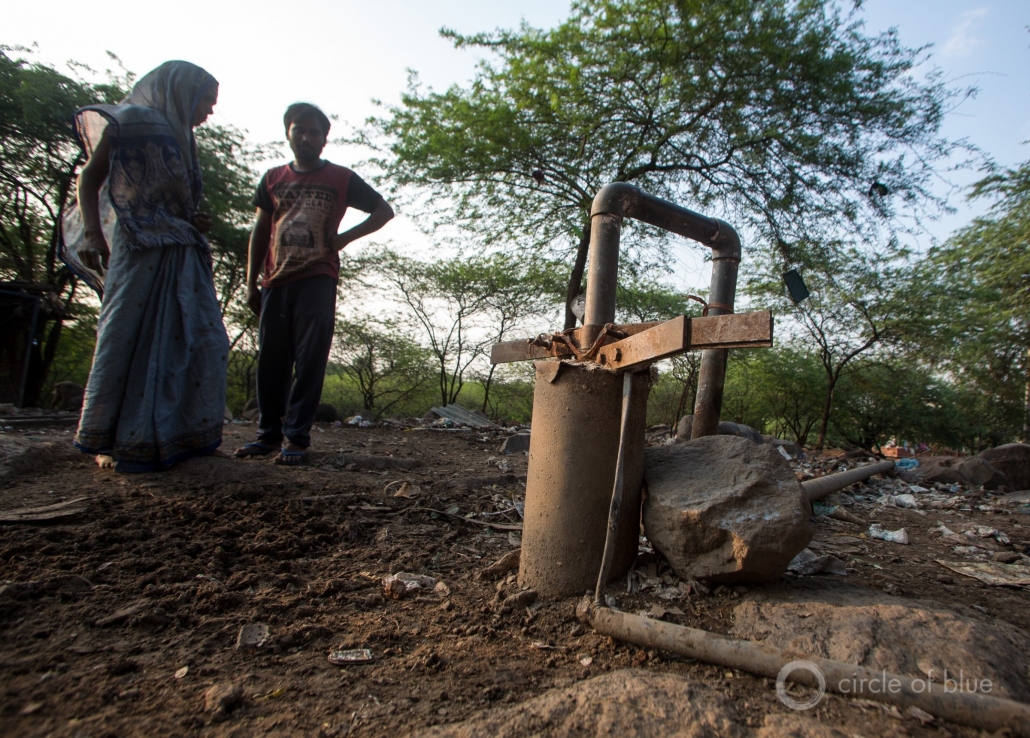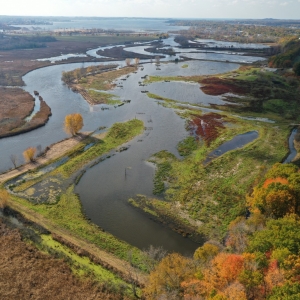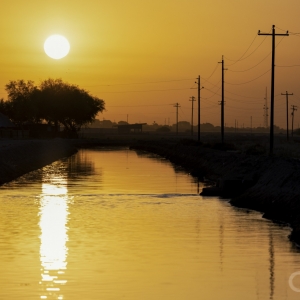The Stream, August 10, 2022: Toxic Metals Discovered In India’s Groundwater

A well outside of Delhi, India. Photo © J. Carl Ganter/Circle of Blue
YOUR GLOBAL RUNDOWN
- A major desalination plant in London will not open if England declares a drought emergency.
- Government data reveals groundwater contamination across India.
- Officials in Bangladesh draft a plan to replenish drying aquifers in the capital city of Dhaka.
Piped water is on the way to an immigrant community in Southern Texas after decades.
“I’m happy to see they’re finally going to get it. I honestly didn’t think anything was going to happen.”
-Joaquin Duran, who grew up without running water in Cochran, Texas.
More than 134,000 people living in Texas colonias–unincorporated, low-income housing developments along the Mexico-U.S. border–have lived without running water for decades. Many immigrant families, including Duran’s parents, built homes on the borderland based on promises that piped water would arrive within two years. That promise went unfulfilled. To survive, families have hauled water daily to their homes, or paid for potable water to be delivered. Residents must also pay for drinking water out of pocket. Now, thanks to a collaboration between the non-profit DigDeep, local officials, and a Texas-based non-profit, Cochran residents will soon have piped water. For other colonias, however, the problem remains. Chilton Tippin, a cultural anthropology graduate student who has conducted research in Cochran told the Guardian, “All these border cities are projecting upward population growth, yet the funding is coming in at an inverse proportion to that. I think that is a recipe for hardship and more problems in the future.”
— Jane Johnston, Stream Editor
Recent WaterNews from Circle of Blue
Eastern Kentucky Floods Continue Cycle of Poverty – The hardest-hit areas are some of the poorest in the United States.
Arizona and California Farmers, Targets for Colorado River Cuts, Draft Their Conservation Strategy – Nearly 1 million acre-feet of compensated water cuts are being discussed.
‘A Tsunami of Human Waste’: Half of South Africa’s Sewage Treatment Works Are Failing, Says Report – CCIJ reports that rivers and water bodies across South Africa have become too polluted for use, and the government is doing an increasingly poor job of addressing the situation, according to a long-awaited audit of the country’s wastewater.
Drought in the American West
- Drought conditions look similar to last week’s numbers. As of August 2, 43 percent of the U.S. and Puerto Rico are in drought, down over two percentage points in the last month.
- Colorado River tribes demand the Department of the Interior and basin states include them in river-use reduction plans.
- The U.S. Senate passes a major climate bill, which includes $4 billion to tackle drought.
- Cities in the Rio Grande Valley implement water restrictions as reservoirs reach near-historic lows.
For this week’s biggest headlines out of the drying American West, read Circle of Blue’s weekly roundup.
This Week’s Top Water Stories, Told In Numbers
£250 MILLION
As British officials consider a drought declaration amid extreme heat and persistent dry conditions, a major desalination plant in London announced it will not start supplying drinking water to residents for at least another year. The Thames Water Plant at Beckton, east London, opened in 2010 with intentions to supply drinking water for up to 1 million Brits during times of crisis. Now, the company says it has scaled back the estimated supply of the plant by a third, and that more work was to be done at the plant before it could begin operating.
- More U.K. News: Liberal Democrats are calling for a ban on bonuses for water company leaders until major issues with leaky pipes are resolved. Data revealed by the party showed that company heads were awarded millions in bonuses, benefits and incentives over the last two years, despite reports that water companies in the U.K. allow 2.4 billion liters of water to be leaked every day.
80 PERCENT
A new report from the Indian government shows that citizens in most parts of the country are routinely exposed to toxic metals in groundwater. The data revealed that
- Arsenic has been discovered in 209 districts in 25 states and Union territories.
- In 491 districts among 29 states, excess amounts of iron were found.
- Across 16 states, chromium was discovered at levels over 0.05 mg per liter.
- Toxic levels of uranium were also detected in 18 states.
Government records show that over 80 percent of the country’s population draws water supplies from groundwater. Consuming water containing toxins like arsenic, iron, and uranium can increase risks of cancer and have been linked to diseases like Alzheimer’s and Parkinson’s.
On the Radar
As groundwater supplies in Bangladesh continue to rapidly deplete, water management authorities have drafted a plan to recharge aquifers serving some of the country’s most vulnerable residents. The plan includes options to replenish aquifers in the capital city of Dhaka and other critical areas with stormwater, reclaimed water, desalinated water and potable water. Aquifers are typically replenished by surface water that seeps into the ground, but over extraction of groundwater in Bangladesh stops this process from occurring naturally.
More Water News
Saltwater Intrusion: Saltwater is seeping into California rivers, contaminating key sources of irrigation water for the state’s farmers.
- Why it matters: Saltwater intrusion challenges nearly every town and farm district in California that borders the Pacific, Circle of Blue reported in 2015. But last week, Circle of Blue reported that the salty waters are also creeping into low-income communities and tourist towns across the East Coast.
Buried Bombs: A previously submerged World War II-era bomb was discovered in Italy as the country’s River Po dropped to record lows.
Kentucky Floods: Outdated infrastructure may be to blame for devastating flooding across the United States last week. Former mining regulators say that strip mining, a process in which vegetation and surface layers of rock and soil are blown up to retrieve coal reserves buried underneath, may share that responsibility in Eastern Kentucky.
Jane is a Communications Associate for Circle of Blue. She writes The Stream and has covered domestic and international water issues for Circle of Blue. She is a recent graduate of Grand Valley State University, where she studied Multimedia Journalism and Women, Gender and Sexuality Studies. During her time at Grand Valley, she was the host of the Community Service Learning Center podcast Be the Change. Currently based in Grand Rapids, Michigan, Jane enjoys listening to music, reading and spending time outdoors.






Leave a Reply
Want to join the discussion?Feel free to contribute!